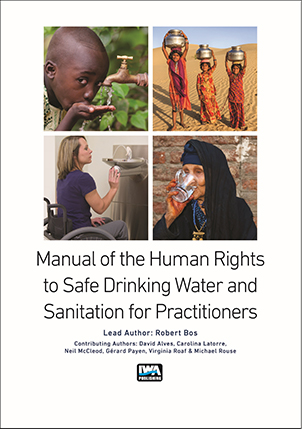Translating Human Rights criteria into operational terms
Translating the Human Rights criteria into action is a challenge for water and sanitation professionals, particularly for regulators. Mohamed Tawfik and the IWA Communications department for Water Policy and Regulation have procvided a helpful outline and infographics to illustrate some of the key criteria & principles in relation to drinking water supply and sanitation services.

Human Rights Criteria for Drinking Water Supply
Availability refers to sufficiency in terms of quantity and reliability in terms of services continuity without interruptions, Quality refers to drinking water free from pathogens and toxic substances, Acceptability refers to acceptable appearance, taste and color for the customer, Accessibility refers to the distance to a reliable water supply and whether the services are available to everyone without discrimination, Affordability of water services refers to the cost of connection and consumption.
“There are no absolute values for any of these criteria that apply globally. Governments will have to establish national standards in line with local natural resources situations” (Human Rights Manual for Drinking Water and Sanitation – HRWS).
Regulators and operators for water and sanitation services in each country will need to follow a “guideline” in order to achieve a progressive realisation of the HRWS;
-
Equality and non-discrimination: within the established regulatory framework has to ensure access to all groups and individuals, in a consultative process with such individuals/groups and government authorities.
-
Accountability: includes monitoring systems, complaints mechanisms, dispute resolution and transparency of budget, and compliance with legal requirements.
-
Sustainability: ensure the economic, social and environmental sustainability of water and sanitation services.
-
Participation: community engagement is an essential factor to comply with the human rights criteria
-
Access to information and transparency: public participation and community engagement cannot be realised without full access to information and on budget and operations.
Human Rights Criteria for Sanitation Services
Availability sanitation facilities should be available for “everyone, everywhere, at all times”, Quality refers to safe collection, transport, treatment and disposal of human waste, Acceptability refers to cleanliness and hygiene, Accessibility access should be ensured to all (women, men, children, the elderly and the disabled), Affordability “no-one is excluded” should me the main driver behind the regulatory framework for sanitation services.

Learn more
Find out more about IWA's work on Policy and Regulations on their web page and the IWA Specialist Group page.
Robert Bos's Manual on the Human Rights to Safe Drinking Water and Sanitation for Practitioners is an essential textbook covering the key aspects of this topic.

